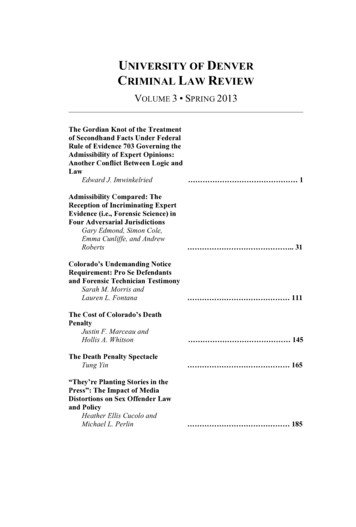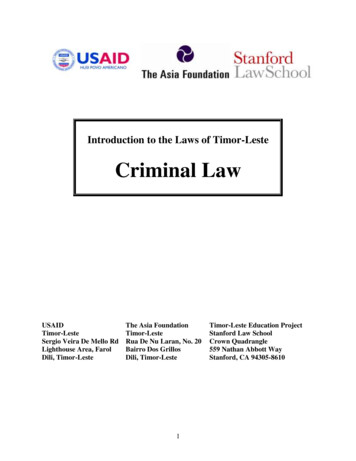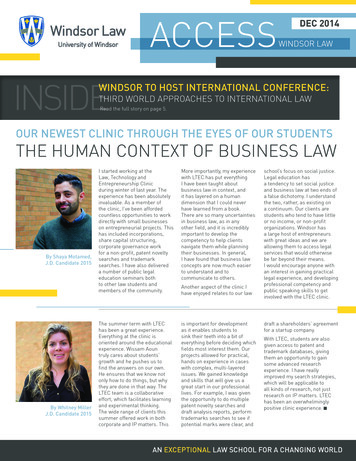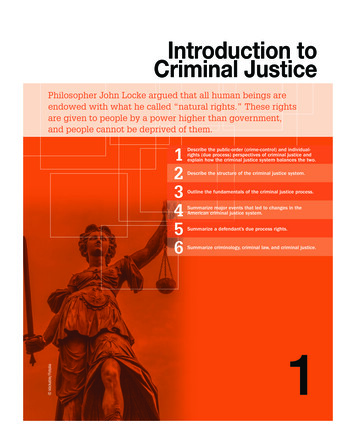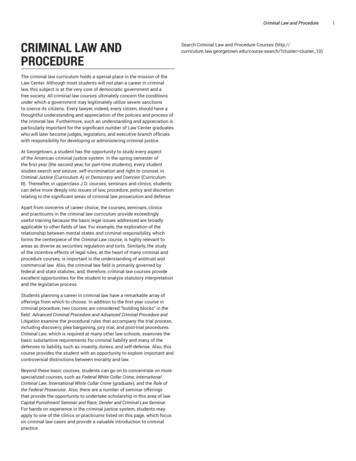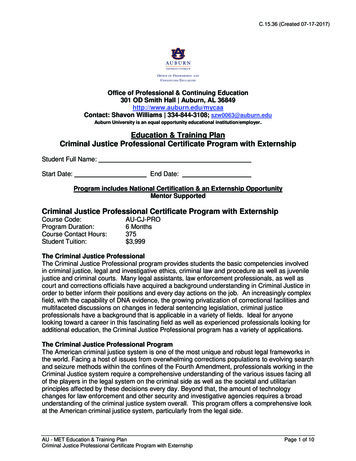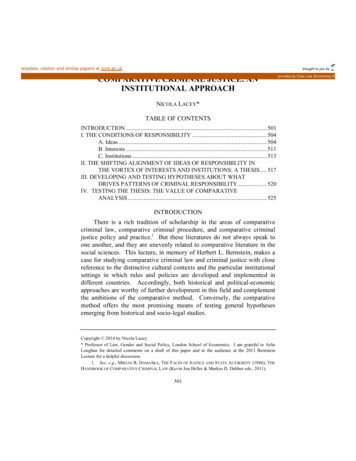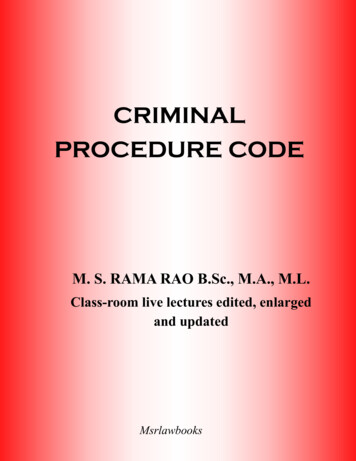
Transcription
CRIMINALPROCEDURE CODEM. S. RAMA RAO B.Sc., M.A., M.L.Class-room live lectures edited, enlargedand updatedMsrlawbooks
CRIMINALPROCEDURE CODEby M. S. RAMA RAO B.Sc., MA., M.L.,Text and Reference Books:Govt. of India Publication: Cr. P. C.: Bare Act 1973. :Chitaley D.D.Cr. P.C Vols. 1 to 3.Basu: Cr. P.C. 1973.Page1RatanlalmsrlawbooksCriminal Pro Code
CONTENTS(Cr.P.C.1973Pages1 CHAPTER 1 Definitions71. First Information Report2. Bailable and Non-bailable Offences.3. Cognisable and Non-CongnisableOffences4. Complaint5. Compoundable Offences6. Police Station, Police Report,Police Diary2 Criminal Courts111. Classes of Criminal Courts2. Executive Magistrates3. Public Prosecutor and APP3. Maintenance of Wife and Children124. Confession145. Double Jeopardy166. Investigation181, Investigation, Inquiry and Trial2. Powers and duties of a Police Officeron receipt of FIR7. Offenders1. Approver212. First offenders3. Habitual offender4Juvenile offendersPage25 Proclaimed offender8. Search & Arrest251. Search WarrantmsrlawbooksCriminal Pro Code
2. Search how made3. Arrest without warrant4. Arrest by a private person5. Arrest how made9. Preventive Provisions1. Urgent Cases of Nuisance282. Disputes as to land or water10. Bail & Bond1. Bail2. Bail in Non-Bailable Cases313. Anticipatory Bail11.1. Charge342. Joinder of Charger12. Trials1. The trials in the Cr. P.C.362. Sessions TrialWarrant Case Trial3. Summons Case Trial4. Summary Case Trial5. Irregular Proceedings6. DeNovo Trial7. Summons case and warrant case8. Discharge and Acquittal13. Limitation4314.44Additional Topics1. Exceptions2. Remand3. Security4. Death Sentence5. ReferencePage36. Revision 7.AccusedREFERENCE SECTIONmsrlawbooksCriminal Pro Code 51 to 84
SYLLABUSCr.P.C.I973 (Sns.l to 484)1.Definitions: Bailable and Non-bailable offences, Cognisable andNon-cognisable offences, Charge, Complaint, Inquiry, Investi-gation and trial, Offence, Summons Case, Warrant Case,Proclaimed Offender.2.-Constitution of Criminal Courts and Offices.3.Powers of the Court.4.Superior Police Officers and Duties of Public.5.Arrest of Persons: (i) Arrest without Warrant, (ii) Arrest byprivate persons, (iii) Arrest how made- Power to seize etc.6.Processes: Summons; Warrant of Arrest; Proclamation andattachment.7.Summons to produce documents or things. Search WarrantsSearch how made-seizure.8.Security for keeping the peace and' for good behavior.9.Maintenance of Wife and Children (sn.125).10.Maintenance of Public Order and Tranquility.Sn. 144: Urgent Cases of Nuisance.Sn.145: Disputes as to immovable property.11.Preventive action by police.12.Information to Police-powers to Investigate (Sn.154 to 176);13 Confession (Sn. 164)14 Jurisdiction of Criminal Courts in inquires15 Trials. Complaints to Magistrates. Commencement ofPage4proceedings- before Magistrate.16.'Charge', 'Joinder of charges'.17.(i) Sessions Trials (ii) Warrant Case Trial (iii) SummonsCaseTrial (iv) Summary Trial.18.Commissions.19.Appeal, reference and revision, Transfer of Criminal Cases.20.Death Sentence, Imprisonment, Fine etc.21.Bail and Bonds.msrlawbooksCriminal Pro Code
22.Irregular Proceedings.23.Period of limitation to take Cognisance of some offences.24.Trials before High Courts [.First and Second Schedule.]QUESTIONS BANK1.Write explanatory notes on: .(a) F.I.R. (b) Bailable and non-bailable offences (c) Cognisableand Non-cognisable offences (d) Complaint (e) Compoundableoffences (f) Executive Magistrate (g) Public Prosecutor (h) PoliceDiary, (i) Irregular Proceedings.2.Explain the provisions relating to the speedy remedy providedfor, to claim maintenance by wife and children.3.What is confession? How is it recorded?4.Explain the concept of Double jeopardy with reference to Sn.300Cr.P.C. Refer to exceptions.5.What are the powers and duties of a Police Officer in charge ofPolice Station on receipt of information relating to the commission ofa Cognisable offence or a Non-cognisable offence.6.Explain:(a) First Offenders (b) Habitual Offenders(c) Write a note on Summons-case trial and Summary trial.9.(a) What is a Search Warrant ? How is search made ?(b) When can a Police Officer arrest without Warrant. How isarrest made ?10. (a) How are urgent cases of Nuisance dealt with under Sn.144.Cr.P.C.(b) Detail the measures contemplated by the Cr.P.C. withreference to disputes as to a right in respect of land or water. (Sn.145).11.(a) What is a bail ? How is a bail granted ?(b) Can a bail be granted in non-bailable offences ?(c) Explain Anticipatory bail.(d) What is a Bond? Now is it executed?Page512. What is a Charge ? What are its contents ? Explain "joinderof charges".13.What is the significance in Cr.P.C. of the period of limitation?msrlawbooksCriminal Pro Code
14.Write short notes on:(a) Remand(b) Death Sentence(c) Revisional Powers of the High Court and the Session Court.(d) Processes of Courts(e) Security for good behaviour.(f) Security for keeping the peace(g) Accused as a defence witness(h) Prosecution of public servant(i) Prevention of Nuisance.(h) Proclamation of attachment(i) Appeal ,Revision and reference.15.Distinguish between.(a) Summons Case and Warrant Case.(b) Investigation, inquiry and trial.Page6(c) Discharge and Acquittal.16. State the exceptions to the rule that any person may set theCriminal Law in motion. (Sns. 195 to 199).17 Detail a Sessions Trial.18.What is a Warrant Case? Detail its procedure.msrlawbooksCriminal Pro Code
CHAPTER 1DEFINITIONSCh.l .l. First Information Report:(i) Communication of information of a cognisable or a noncognisable offence to the Police Officer in writing is called F.I.R. Infact,it is the information first in point of time which sets the Criminal Lawin motion. Subsequent information received is not F.I.R.(a) In non-cognisable offences, when the information is givento the Police Officer (Sub-Inspector), he should enter the substanceof information in the "Police Diary" and refer the informant to theMagistrate.(b) He should not start the investigation without the ordersof the concerned Magistrate. But, on receiving such an order, he mayexercise the same powers in investigating as in cognisable cases.However, he should not arrest or search without warrant. If thePolice Officer makes an investigation without orders then his reportitself will be construed as a complaint and the Police Officer is deemedto be the "Complainant".(c) In Congnisable Offences, according to Sn.154 Cr.P.C, theF.I.R. is recorded by the Police Officer.If it is oral, it is reduced to writing, read over to the informantand is signed by the informant. Information is in writing it is signed bythe informant. The substance of the F.I.R. is recorded in the prescribedbook (Police Diary).A copy of the F.I.R. should be given to the informant.A telephone message received by the Sub-Inspector andrecorded by him in his Diary is a F.I.R.Page7(ii) If the Police officer refuses to record the F'.I.R. the informant may send the substance of such information to the S.P. by post,who may take the necessary action; He may provide for investigation.F.I.R. should be lodged at the earliest point of time. The objectof F.I.R. is to receive information and to record the circumstancesbefore the person forgets to establish the information.(iii) Probative Value:- According to the Supreme Court F.I.R.is not a substantive evidence. It is used to contradict or to corroborate the informant.Ch.1,2. Bailable and Non-Bailable Offences: Sn.2(a) Cr.P.CmsrlawbooksCriminal Pro Code
The Cr.P.C. classifies offences into bailable and non-bailable.Schedule I to Cr.P.C. specifies in detail.Eg.: Counterfeit of coin, Robbery, Murder etc., are non-bailable But Mischief, House trespass etc. are bailable.In bailable offences bail is a matter of course. Police Officers,Courts, Magistrates, Sessions Judge, High Court may release aperson on bail.In non-bailable cases, bail is not allowed, but a person may bereleased on bail (Sn.437). In offences punishable with death orimprisonment for life there is no bail. In Murder, counterfeit, Seditionetc. no bail is granted.The bail amount should not be excessive and should be fixedtaking into consideration the circumstances of each case. The accusedshould execute a bond, with or without sureties as the case may be,thereupon he is released.Exemption: In non-bailable offences, a person under 16, or anywoman under any case or any sick or infirm person may be releasedon bail even if punishable with death or imprisonment for life.Ch.1.3. Cognisable and Non-cognisable Offences : Sn.2(c) Cr.P.C.Offences may be classified into Cognisable and Non-Cognisable. A Non-Cognisable offence is one in which a police officer maynot arrest without warrant. In cognisable offences, he may arrestwithout warrant. The Cr.P.C. has mentioned these offences in theschedule. The Police Officers are guided by the above classification,and the I Schedule.Sn.41 Cr.P.C. enumerates various categories under which thePolice Officer may arrest without warrant, that is:(a) Cognisable Offences.(b) Proclaimed Offender.(c) Extraditable Offence.(d) Deserter of Army.(e) Released Convict.Page8(f) Person with House-breaking tool or stolen property etc.Ch. 1.4. Complaint: Sn.2(d) Cr.P.C.A complaint is an allegation made by a person called the complainant, orally or in writing, to a Magistrate, with view to his takingaction under Cr.P.C., that some person (known or unknown) has committed an offence.In Cognisable offences, the police officer proceeds to directlyinvestigate. But, in non-cognisable offences, he can investigate on theorders of the Magistrate. The New Cr.P.C. provides a remedy, wheremsrlawbooksCriminal Pro Code
the police officer has made an investigation in non-cognisable cases,without the orders of the magistrate. According to it, a police reportmade by a police officer, in a case which discloses, (after investigation) the commission of a non-cognisable offence, shall be deemed tobe a complaint. Further, the police officer who prepared such a reportis deemed to be the complainant.A complaint is made to the Magistrate only. What is given tothe Police is only a report. It is not necessary that the name of thealleged offender must have been mentioned. It may not clearly specifyor even wrongly specify the nature of the offence.On the basis of the complaint the Magistrate takes cognisanceof the case and proceeds with the examination of the complainant.Complaint by an idiot or lunatic:In this case the complaint may be made by any other personcalled 'next friend', with the permission of the court. Hence thoughthe lunatic cannot make a complaint, the next friend can make on hisbehalf.Ch.1.5. Compoundable offences : Sn.320 Cr.P.C.Offences are grouped into compoundable and non-compoundable. Compounding means 'making a compromise'. Compromise maybe made (i) with the permission of the court or (ii) without thepermission of the court.Compounding is allowed because the complainant and theaccused may make some compromise within themselves, i.e., theyagree to settle their differences mutually.Compromise once made cannot be withdrawn. It can be madeat any time before the sentence is pronounced by the court.The Cr.P.C. has provided the table mentioning the offenceswhich are to be compounded with the permission of the court.Ex.: (i) Theft (value below Rs.250/-)(ii) Cheating.(iii) Cheating by personation.(iv) Bigamy.(v) Insulting the modesty of a woman etc.The composition is as good as the acquittal of the accused.In cases of hurt, assault, Cr. trespass, defamation etc., mentioned in the Cr.P.C. the offences are compoundable without thepermission of the Court. The new Cr.P.C. has added a few moreoffences to the above list.Page9Compounding without the permission of Court:msrlawbooksCriminal Pro Code
Ch.1.6. Police Station, Police Report, Police Diary:Police Station: Means any place (or post) declared generally orspecifically by the State Government to be a Police Station andincludes any local area specified by the State Govt. in this behalf.Police Report: This is report forwarded by a Police Officer to aMagistrate under Sn. 173(2).Under Sn.173, investigation is to be completed without anydelay. On completion he prepares a report containing:(i) Name of the parties.(ii) Nature of information.(iii) Names of Prosecution Witnesses(PWs.)(iv) Whether any offence is committed and if so by whom.(v) Whether the accused is arrested etc.He also forwards:(i) All documents and all exhibits.(ii) Statements of witnesses etc.With the submission of completion report, the duty of thePolice Officer ends, and, the duty of the Magistrate begins.Police Diary: Every investigation Police Officer should maintain a Diary (Station House Diary or Police Diary). He should enterhis day to day proceedings in it. He shall mention the time of receiptof information, when investigation started and when closed, placesvisited etc. and a statement of circumstances.The diary may be called for, by the Criminal Courts. This is notused as evidence.Page10The accused has no right to get into the diary. The PoliceOfficer may use it as aid to memory (Aide memorie), in such a case,the accused has a right to get into the diary.msrlawbooksCriminal Pro Code
CHAPTER 2CRIMINAL COURTSCh.2.1. Classes of Criminal Courts: Sn.6. Cr.P.C.Below the High Court, the following Criminal Courts areconstituted.(i) Sessions Court(ii) I class Judicial Magistrate,(iii) II Class Judicial Magistrate (iv) Executive Magistrate.The III class Magistrates have been abolished.The Judicial Magistrates and Executive Magistrates are givendifferent and distinct functions and powers under the Cr.P.C.Ch.2.2. Executive Magistrates:The State Government may appoint Executive Magistrates ineach district and one of them as District Magistrate and if need beanother as Additional District Magistrate. A Commissioner of Policemay be vested with the powers of an Executive Magistrate.Executive Magistrates have jurisdiction in various cases: (i) Sn.107Order to execute bond for keeping peace, (ii) Sn. 129 Dispersal ofassembly by use of Civil force, (iii) Sn.144 Urgent cases ofNuisance etc. (iv) Sn.145 Disputes as to Possession of immovableproperty.Ch.2.3. Public Prosecutor and A.P.P.The State Government has the power under Cr.P.C. to appointPublic Prosecutors at the High Court level and at district level isconsultation with the High Court and the Sessions Court.The District Magistrate prepares a panel of names who are fitto be appointed as Public Prosecutors.The minimum qualifications is at least 7 years practice as anAdvocate. The Public Prosecutor is a public servant.Asst. Public Prosecutors are appointed by State Govt. in eachdistrict for conducting prosecution in Magistrates Courts. No PublicOfficer below the rank of a Police Inspector and who has madeinvestigation in the case can be appointed as A.P.P.Page11Office of the A.P.P. is the creation of the new Cr.P.C. A.P.P.may appear before Magistrates court. He is not under the control ofthe Police Department.msrlawbooksCriminal Pro Code
CHAPTER 3MAINTENANCE OF WIFE AND CHILDRENCh.3. Maintenance of Wife, Children and Parents:Sn.125 Cr.P.C. deals with the provisions relating to maintenance of wife, children and parents. One essential duty of the husbandis to maintain his wife and children if they are not in a position tomaintain themselves. The Cr.P.C. provides for a speedy remedy. Thedetails are provided for in Sn.125 Cr.P.C.Changes made in the Cr.P.C.1973:The Joint Committee appointed by the Parliament had madecertain observations. On the basis of these, some changes have beenintroduced in Sn.125 Cr.P.C.(i) The Magistrate may make an order if the wife is unable tomaintain herself.(ii) The benefit is available to the parents also.(iii) The benefit is available to a divorced wife so long as shedoes not remarry. This secures social justice to women.(iv) In respect of children, maintenance benefit is available upto 18 years. After that there is maintenance, only if the child is undera physical or mental abnormality or injury unable to maintain itself.A husband having sufficient means, may neglect to maintain hiswife and children and parents. The Children may be legitimate orillegitimate. The wife and children and father and mother if they areunable to maintain themselves may move an application before theconcerned Magistrate. If the Magistrate is satisfied about negligenceor refusal of the husband to maintain his wife, children or parents hemay make an order against the husband for payment of a monthlyallowance. Such amount shall not exceed Rs.500/- per month. TheMagistrate may order the payment to the applicant.The amount becomes payable from the date of the order orfrom the date of the application by the wife. This is decided by theMagistrate.Page12Enforcement of the Order:The Magistrate, if he finds that the husband though he hadsufficient means has failed to comply with the order, without anyreason, may for every such breach, issue a warrant and may sentencethe person to imprisonment for a month or until the amount is paid.The husband may offer to maintain his wife, if she is willing to livewith him. But if the wife refuses on the ground that the husband hasmarried another wife or has kept a mistress then it is a valid groundfor her to refuse to live with him and to live separately.msrlawbooksCriminal Pro Code
Limitations:i) The amount should be claimed by the wife within a year fromthe date of the order of the Magistrate.ii) The wife is not entitled to receive maintenance if she is livingin adultery.iii) She cannot get maintenance if, without proper reason, sherefuses to live with the husband.iv) She cannot get maintenance if she is living separately withmutual consent.If the above grounds are shown, the Magistrate may cancel theorder of the maintenance.Recording of Evidence:The Magistrate shall record the evidence in the presence of thehusband or his advocate. He shall follow the procedure of a summonscase trial. He can also proceed Ex-parte (absence of the husband) ifthe husband wilfully neglects to attend the court. The ex-parte ordercan be cancelled within three months if there is a strong reason.Scope of the Order:Page13The monthly allowance may be increased if there are sufficientreasons. However the maximum is Rs.500/- per month. TheMagistrate shall give a copy of the order to the wife and such an ordermay be enforced by any Magistrate in any place in India where thehusband may live. Such Magistrate has the same powers to enforcethe order, as the Magistrate who made the order for maintenance.msrlawbooksCriminal Pro Code
CHAPTER 4CONFESSIONConfession: Sn.164 Cr.P.C.Confession means admission by the accused of his guilt. TheMagistrate may record a statement of confession made:i) In the course of investigation ORii) At any time before the commencement of the trial. Noconfession can be recorded by the Police Officer. If recorded it is notadmissible.The Magistrate records the confession in the same manner ashe records evidence.In the Evidence Act Sn.27 and 28 deal with confession.Accordingly, confession must be recorded by the Magistrate only.Accused 'A' makes a statement. 'I have thrown the dagger in a well.I have killed 'D' with it" Here, if in persuance of the statement, thePolice Officer discovers, the dagger, the fact that it was discovered isadmissible in evidence. But the statement I have killed 'D' with it, isnot allowed.Confession is not to be used as substantive evidence.Procedure:Before recording the confession, the Magistrate explains to theperson making it that he is not bound to make it and that it may beused as evidence against him. The Magistrate records only if thestatement is made by the person voluntarily. He must be fullyconvinced about the truth or the veracity of the statement. Even ifthere is an iota of suspicion about the truth, the Magistrate may refuseto record the confession.Recording:When recording, he makes a memorandum, explains to theaccused that:The accused is not bound to make a Confession, that if. made,his statement may be used against him as evidence. He must certifythat the statement was voluntary, that it was done in his presence andhearing, that it was read over to him and admitted by him to becorrect and that it contained a full and true account of the statementmade by him.Page14At the foot of the memorandum, the Magistrate shall sign, sealand put the date.Contents of the Memorandum:The contents should be to the following effect:"I have explained to the accused Sri . that he ismsrlawbooksCriminal Pro Code
not bound to make a confession; If he does so, same may be suedagainst him I further certify that the confession was voluntary, it wastaken in his presence and hearing, that I read it over to him, that headmitted as correct that is was a full and true account of theconfession made"Signature of Magistrate with Seal and Date.Evidentary Value:In Ram Kishan V. Harmit Kaur, the Supreme Court has heldthat the confession statement is not 'substantive evidence'. It can beused to corroborate the evidence of a witness or to contradict him.A Magistrate who has no jurisdiction is also empowered torecord the confession but then the records are to be sent to theMagistrate who conducts the trial. (Brij Bhushan V.King).Page15In order to ensure that the confession is voluntary, it prohibitsthe detention of the accused in police custody, (when he is unwillingto make a confession before the Magistrate).msrlawbooksCriminal Pro Code
CHAPTERS DOUBLEJEOPARDYCh. 5 Double Jeopardy : Sn.300 Cr.P.C.One fundamental principle of Criminal Law is that no personwho has been accused of an offence should be prosecuted and punished for the same offence more than once. This principle is containedin Art.20(2) of the Constitution and also in S.300 Cr.P.C.The origin of this is in the English Law 'Nemo debet Bis Vexari'(no one shall be vexed twice). This has two cordinal rules, namely:(a) Autre fois acquit (previous acquittal)(b) Autre fois convict (previous conviction)According to this if a person has been prosecuted and eitherconvicted or acquitted, then the accused should not be tried again byany Court in India, for the same offence.In Venkata Raman Vs. Union of India, Venkataraman wassubjected to a departmental inquiry and was dismissed from CentralGovernment services on grounds of bribery. The police arrested himunder 161IPC. for bribery. He contended that he should not be triedagain. The Supreme Court held that the departmental proceedingswas not a prosecution and therefore he cannot get the benefit.In Maqbul Hussain Vs. State of Bombay-M was subject to aninquiry by the custom authorities who confiscated gold from himand also fined him. Held Custom proceedings were not prosecutions.According to the Supreme Court, prosecution and punishmentmust be read in a conjunctive sense. That is, if a person is prosecutedand punished, he should not be tried again. Hence if a person is prosecuted and acquitted, the Constitution is silent about this. But Sn.300Cr.P.C. provides that if a person is prosecuted and convicted oracquitted he should not be tried again for the same offence.Exceptions:Sn.300 provides for the following exceptions:(i) If the lower court has no jurisdiction at all, then the ruledoes not apply. The accused can be tried again.Page16(ii) If a person is tried for a distinct and separate offence, thenthe rule does not apply and, with the consent of the State Government he may be tried for a separate charge which he could have beentried in the former trial.Ex. (a) Servant 'A' is tried on a charge of theft and is acquitted.He cannot be tried again for theft or criminal breach of trust.(b) A is tried on a charge of murder and acquitted. It appearsmsrlawbooksCriminal Pro Code
that there was robbery also before murder. A may be tried forrobbery.(iii) If a person is tried for an offence but subsequently if it turnsout that the consequences of the act resulted in a different offencea together, the person may be tried.Ex. (a) A causes grievous hurt and is convicted. The injuredrson dies in the hospital. A may be tried for culpable homicide.(b) A is tired for culpable homicide and convicted. HE cannottried again on the same facts for murder.Scope:Double jeopardy benefit does not apply to execution proceedings.Page17(i) What is barred is the second prosecution for the sameoffence on the same facts. (Sn.22l)msrlawbooksCriminal Pro Code
CHAPTER 6INVESTIGATIONChl6.1. Investigation, Inquiry and Trial:Sn.2(h): "Investigation"includes all the proceedings under theCr.P.C. for the collection of evidence conducted by a police officerorperson authorised by the Magistrate.Sn.2 (g): Inquiry means every inquiry, other than a trial, conducted by a Magistrate or Court under Cr.P.C.Investigation, inquiry and trial denote the three successivestages in the Criminal proceedings.(i) Investigation: is conducted by the Police Officer. The objective is to collect evidence in respect of the case on hand. It startswitjh the F.I.R.It includes: Proceeding to the spot, getting the facts andcircumstances, collecting all the evidence available, examiningperjsons, arresting the accused, making the search, seizing materialsetc He submits a report to the Magistrate in the prescribe form.(ii) Inquiry : The end of investigation is the beginning of theinquiry. This is a proceeding of the Magistrate or Court prior to trial.The objective is to find the truth or falsity of the facts to proceedfurther, to take action.If there is any truth, there will be a trial otherwise theaccused is discharged. Enquiry may be judicial, non-judicial, localor preliminary. Examples are: proceedings for maintenance of wife achildren, enquiring for keeping the peace. Proceeding under Sn.145Cr.P.C. is an inquiry.Page18(iii) Trial: The essence of this is that the Proceeding ends inconviction or acquittal. An inquiry is not a trial. The sessions trial andthe warrant case trial are examples. (In a summons case, there is noformal charge or inquiry).msrlawbooksCriminal Pro Code
Ch.6.2. Powers and duties of a Police Officer on receipt ofF.l.R.: Sns.154 to 175 Cr.P.C.Information:Information relating to cognisable offence, may be given by anyperson to the Police Officer. It may be oral or in writing. If it is oralit is reduced to writing, read over to the informant, signed by him.The substance of it is entered in the Police Diary. If the information isin writing it is signed by the informant and the substance is entered inthe police diary. This information is F.l.R. A copy of this shall begiven free of cost to the informant.If the information is in respect of a non-cognisable offence, thepolice officer cannot directly investigate. He refers the information tothe Magistrate. If the Magistrate orders, then only the Sub-Inspectormay investigate.If the officer refuses to record in cognisable case, the informantmay by post send the substance of information to the S.P. concerned,ivho may direct investigation in suitable cases.Spot Investigation:The Police Officer informs the Magistrate and proceeds to thepot for investigation and for collecting the facts and circumstancesof the case. He also takes steps to arrest the accused.On arriving he calls a few respectable persons of the localityand in their presence he conducts the Mahazar. These persons arepanchanamas (witnesses).he will draws up a report. In case ofmurder, he examines the bruises, wounds etc. Weapons ,if any, areseized and sealed. Blood, stained clothes and other things found aresealed as 'Exhibits'. The dead body is then sent to postmortem. ThePolice Officer draws up the report and it is signed by thepanchanamas. This is called the mahazar reportThe Police Officer may require the attendance of personsacquainted with the circumstances of the case. Male below 15, and afemale of any age may not be called to the Police Station. He examines them orally.Page19Statements made during investigation may be reduced towriting. They need not be signed. He should not use force .or inducethem. Such a statement may not be used in a trial. He is empoweredto 'Search' (Sn.165).The accused may be arrested without warrant in cognisablecases. He must be produced before the Magistrate within 24 hours ofthe arrest. He may be kept in custody under the order of the MagismsrlawbooksCriminal Pro Code
trate. The maximum period is 15 days (Remand). But according to thenew Act, this may be extended if the Magistrate is satisfied that thereare adequate grounds. The maximum period of detention shall be 60days. Thereafter, he shall be released on bail. Remand should be made,only after the accused is produced before the Magistrate. TheMagistrate shall record the reasons for Remanding.Police DiaryThe Police Officer should maintain a diary and record.(i) The time of reception of F.I.R.(ii) The time of beginning and closing of investigation.(iii) Place visited,(iv) A statement of circumstances. The Criminal Courts maycall for the diary. The accused cannot call on it, except when it isused by the Police Officer to refresh his memory.The Police Officer submits a final report to the Magistratesetting forth:(i) The names of the parties.(ii) Nature of information.(iii) Names of persons concerned with the case.(iv) The accused- whether he is in custody or not.(v) Post Mortem Report, etc.Page20With the final report the investigation comes to an end.msrlawbooksCriminal Pro Code
CHAPTER - 7OFFENDERSCh.7.1. Approver: Sn.306 Cr. P.C.An associate in a crime is called an accomplice. No doubt he isa guilty associate, but pardon is granted to him. He is called the'Approver'. He is granted pardon:(i) To obtain evidence relating to the case and(ii) To use evidence against the other accused. To this end, he isgiven an assurance by the Magistrate, that no act
Text and Reference Books: Ratanlal Govt. of India Publication Chitaley D.D. Basu : Cr. P. C. : Bare Act 1973. : Cr. P.C Vols. 1 to 3. : Cr. P.C. 1973. . it is the information first in point of time which sets the Criminal Law in motion. Subsequent information received is not F.I.R. (a) In non-cognisable offences, when the information is given .
